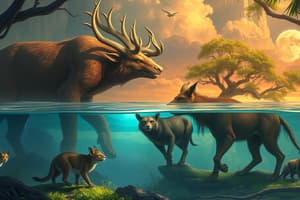Podcast
Questions and Answers
Which term describes an organism's resource use and functional role in the environment?
Which term describes an organism's resource use and functional role in the environment?
- Niche (correct)
- Photosynthesis
- Character displacement
- Partitioning
What process reduces competition among organisms by allowing them to use different methods to acquire resources?
What process reduces competition among organisms by allowing them to use different methods to acquire resources?
- Photosynthesis
- Chemosynthesis
- Character displacement
- Partitioning resources (correct)
What occurs when the evolution of physical characteristics among competing species?
What occurs when the evolution of physical characteristics among competing species?
- Photosynthesis
- Partitioning resources
- Character displacement (correct)
- Chemosynthesis
What process captures energy from sunlight or chemicals and stores it in the bonds of sugars?
What process captures energy from sunlight or chemicals and stores it in the bonds of sugars?
What are consumers that feed on dead and decaying organisms called?
What are consumers that feed on dead and decaying organisms called?
Which of the following correctly lists the levels of ecological organization from smallest to largest?
Which of the following correctly lists the levels of ecological organization from smallest to largest?
What is a group of several organisms of the same species called?
What is a group of several organisms of the same species called?
Which term describes all living (biotic) factors and nonliving (abiotic) factors in a physical environment?
Which term describes all living (biotic) factors and nonliving (abiotic) factors in a physical environment?
What term describes all the different populations in a particular area?
What term describes all the different populations in a particular area?
Which of the following correctly describes the difference between an ecosystem and the biosphere?
Which of the following correctly describes the difference between an ecosystem and the biosphere?
Which organism is labeled as a keystone species in the text?
Which organism is labeled as a keystone species in the text?
What is the primary role of pioneer species in an ecosystem?
What is the primary role of pioneer species in an ecosystem?
What is the main reason why nonnative species become labeled as invasive species?
What is the main reason why nonnative species become labeled as invasive species?
What is the final stage of water succession shown in the image?
What is the final stage of water succession shown in the image?
What is the main reason for the moderate decrease in the population size of Bald Eagles mentioned in the text?
What is the main reason for the moderate decrease in the population size of Bald Eagles mentioned in the text?
An age structure pyramid that is very wide at the bottom and narrows sharply as you move up, displays a growing ______________ population.
An age structure pyramid that is very wide at the bottom and narrows sharply as you move up, displays a growing ______________ population.
If you have an aging population, and not many organisms in their reproductive ages, this population would most likely be labeled ______________.
If you have an aging population, and not many organisms in their reproductive ages, this population would most likely be labeled ______________.
What does an age structure diagram display?
What does an age structure diagram display?
What do survivorship curves describe?
What do survivorship curves describe?
What is the basic difference between density dependent and density independent limiting factors?
What is the basic difference between density dependent and density independent limiting factors?
Flashcards are hidden until you start studying
Study Notes
Ecological Concepts
- The term "ecological niche" refers to an organism's resource use and functional role in the environment.
- "Resource partitioning" is a process that reduces competition by allowing organisms to use different methods for resource acquisition.
Evolutionary and Energy Processes
- "Character displacement" occurs when the evolution of physical characteristics among competing species leads to diversification.
- "Photosynthesis" captures energy from sunlight or chemicals and stores it in the bonds of sugars, serving as a primary energy source for ecosystems.
Consumer Categories
- Consumers that feed on dead and decaying organisms are known as "detritivores" or "decomposers."
Levels of Ecological Organization
- The levels of ecological organization, in order from smallest to largest, are: individual, population, community, ecosystem, biome, biosphere.
- A "population" is defined as a group of several organisms of the same species.
Ecosystems and Environments
- The term "ecosystem" encompasses all living (biotic) factors and nonliving (abiotic) factors in a physical environment.
- The term "community" describes all the different populations in a particular area.
Ecosystem Dynamics
- The difference between an "ecosystem" and the "biosphere" is that an ecosystem is a community of living organisms in conjunction with the nonliving components, while the biosphere includes all ecosystems on Earth.
Species Roles
- A "keystone species" plays a critical role in maintaining the structure of an ecological community, often having a disproportionately large effect on its environment relative to its abundance.
- The primary role of "pioneer species" in an ecosystem is to colonize previously disturbed or barren environments, facilitating ecological succession.
Invasive Species
- Nonnative species become labeled as "invasive species" primarily due to their ability to outcompete native species for resources and disrupt local ecosystems.
Ecological Succession
- The final stage of water succession is known as "climax community," which represents a stabilized ecosystem in equilibrium.
Population Dynamics
- The moderate decrease in the population size of Bald Eagles is often attributed to habitat loss and environmental pollutants.
- An age structure pyramid that is very wide at the bottom and narrows sharply as you move up indicates a growing "young" population.
- An aging population with fewer organisms in reproductive ages is likely labeled as "declining."
Demographic Information
- An "age structure diagram" displays the distribution of various age groups in a population.
- "Survivorship curves" describe how the likelihood of survival varies with age within a population.
- The basic difference between "density dependent" and "density independent" limiting factors lies in their relationship to population density; the former is affected by population size, while the latter is not.
Studying That Suits You
Use AI to generate personalized quizzes and flashcards to suit your learning preferences.




